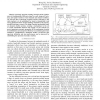Free Online Productivity Tools
i2Speak
i2Symbol
i2OCR
iTex2Img
iWeb2Print
iWeb2Shot
i2Type
iPdf2Split
iPdf2Merge
i2Bopomofo
i2Arabic
i2Style
i2Image
i2PDF
iLatex2Rtf
Sci2ools
INFOCOM
2010
IEEE
2010
IEEE
A Secondary Market for Spectrum
—Dynamic spectrum trading amongst small cognitive users is fundamentally different along two axes: temporal variation, and spatial variation of user demand and channel condition. We advocate that a spectrum secondary market, analogous to the stock market, is to be established for users to dynamically trade among themselves their channel holdings obtained in the primary market from legacy owners. We design a market mechanism based on dynamic double auctions, creating a marketplace in the air to match bandwidth demand with supply. In the analysis we prove important economic properties of the mechanism, notably its truthfulness and asymptotic efficiency in maximizing spectrum utilization. Complimentary simulation studies corroborate that spectrum utilization and user performance can be improved by establishing the spectrum secondary market.
Communications | INFOCOM 2010 | Small Cognitive Users | Spectrum Secondary Market | Spectrum Utilization |
Related Content
| Added | 28 Jan 2011 |
| Updated | 28 Jan 2011 |
| Type | Journal |
| Year | 2010 |
| Where | INFOCOM |
| Authors | Hong Xu, Jin Jin, Baochun Li |
Comments (0)

